
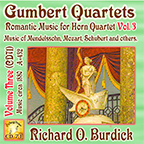
Released: February 18, 2023
![]()
These quartets from the 1880's are really quite nice. There is one more CD that completes the set of four volumes of quartets put out by Gumpert (a.k.a. Gumbert)
![]()
Recorded at A = 432 for health and greater beauty
Performed by:
Richard Burdick's multi-track horn ensemble.
Author, arranger: Friedrich Adolph Gumpert (27 April 1841, Lichtenau (Thüringen) - 31 December 1906, Leipzig) also known as Gumpert, but Gumpert is correct.
A German horn player and teacher. Gumpert received his early musical education in Jena. From 1860 he was a horn player, first in Bad Nauheim, then (after completing his military service) in Halle. In October 1864, at the behest of Carl Reinecke, he became First Horn in the Gewandhausorchester Leipzig, a position he held until 1899. He was a founder member of the Gewandhaus-Bläserquintett, formed in 1896. Gumpert was Professor of Horn at the Leipzig Conservatory from 1882 until his death. As well as Heinrich Lorbeer, his pupils included Anton Horner, Max Hess and Max Pottag, all three highly influential in the development of horn playing in the USA. His publications (all of which appear, erroneously, under the name 'Gumpert') include twelve volumes of orchestral excerpt books (Orchesterstudien) arranged for horn and other wind instruments, a horn method, this set of four volumes for horn quartet , and many arrangements for horn and piano.
This set of CD's has quite a few works by formernly famous composers:
Track 1: Johann Adam Hiller (1728-1804), German 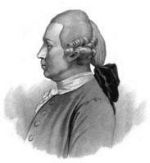 composer and conductor, is regarded as the creator of the German Singspiel, a musical genre combining spoken dialogue and popular song.
composer and conductor, is regarded as the creator of the German Singspiel, a musical genre combining spoken dialogue and popular song.
Track 2: Christian Fürchtegott Gellert, son of Christian Gellert, pastor at Hainichen in the Saxon Harz, near Freiberg, was born at Hainichen, July 4, 1715. In 1734 he  entered the University of Leipzig as a student of theology, and after completing his course acted for some time as assistant to his father. But then, as now, sermons preached from manuscript were not tolerated in the Lutheran Church, and as his memory was treacherous, he found himself compelled to try some other profession.
entered the University of Leipzig as a student of theology, and after completing his course acted for some time as assistant to his father. But then, as now, sermons preached from manuscript were not tolerated in the Lutheran Church, and as his memory was treacherous, he found himself compelled to try some other profession.
Track 7: Franz Wilhelm Abt (1819 – 1885) was a German composer and choral conductor. He composed roughly 3,000 individual works mostly in the area of vocal music. Several of his songs were at one time universally sung, and have obtained a more or less permanent place in the popular repertory. Abt was a renowned choral conductor, and he spent much of the last three decades of his life working as a guest conductor with choirs throughout Europe and in USA
Track 16: Johann Friedrich Diethe: Solo Oboe in the Leipzig Gewandhausorchester from 1836-1866
Track 19: Jagdstück by K. Appel I am making up that the "K." is for Karl since I can't find him anywhere.
Track 24: Campaniola by J. Lang could be Josephine Lang (1815-1880) or Johann Georg Lang (1722-1798)
Track 26: Étienne Nicolas Méhul (French:1765 - 1817)was a French composer of the classical period. He was known as "the most important opera composer in France during the revelution. He was also the first composer to be called a romantic. He is known particularly for his opera, written in keeping with the reforms introduced by Gluck and Mozart
Track 27: Friedrich Wilhelm Kücken
(16 November 1810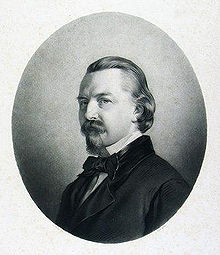 – 3 April 1882) was a German composer and conductor. He was a very prolific composer, mainly known for light and melodious songs, although he has also written works for the stage and for orchestra.
– 3 April 1882) was a German composer and conductor. He was a very prolific composer, mainly known for light and melodious songs, although he has also written works for the stage and for orchestra.
Track 32. Conradin Kreutzer or Kreuzer (22 November 1780 – 14 December 1849) was a German composer and conductor. His works include the operas Das Nachtlager in Granada and incidental music to Der Verschwender, both produced in 1834 in Vienna.
tracks |
Gumpert Quartets vol. 3 |
length |
| 1. | Choral. Alles ist an Gottes Segen Everything is in God's blessing by Johann Adam Hiller (1724-1804) |
|
| 2. | Choral. Nach einer Prüfung kurzer Tage After an examination of short days by Christian Fürchtegott Gellert |
|
| 3. | Choral. Wer nur den lieben Gott Lässt walten Who only lets the dear God prevailby Johann Sebastian Bach | |
| 4. | Choral. Nun danket Alle Gott Now all thank God by Martin Rinkart |
|
| 5. | Choral. Christus, der ist mein Leben Christ, who is my life by Johann Sebastian Bach |
|
| 6. | Choral.Lobet den Herren, den mächtigen Praise the Lord, the Mightyby Joachim Neander 1680 | |
| 7. | Lied. Es ist bestimmt in Gottes Rath It is determined in God's counsel by Franz Wilhelm Abt (1819-1885) | |
| 8. | Ruhethal, Op. 59 No. 5 by Felix Mendelssohn | |
| 9. | Sonntagslied. Ringsum erschallt im Wald und Flur, Op. 35 No. 5 Sunday song. All around resounds in the forest and meadow by Felix Mendelssohn |
|
| 10. | Abschiedstafel. So Rückt denn in die Runde, Op. 75 No. 4 by Felix Mendelssohn |
|
| 11. | Summerlied. Wie Feld und Au' so blinkend im Thau, Op. 50 No. 3 by Felix Mendelssohn |
|
| 12. | Wasserfahrt. Amfernen Horizonte, ersheint wei ein Nebelbild Op. 50 No. 4 by Felix Mendelssohn |
|
| 13. | Jagdlied. Auf, ihr Herrnund Damen schön, Op. 120 No. 1 hunter song. Up, gentlemen and beautiful ladies! by Felix Mendelssohn |
|
| 14. | Lied an die Deutschen in Lyon. Was uns eint als deutsche Brüder Op. 76 No. 3 |
|
| 15. | Andante by Franz Schubert | |
| 16. | Ouverture & Allegro Moderato by Johann Friedrich Diethe |
|
| 17. | Parademarsch Parade March by August Lidner |
|
| 18. | Amicitia = Quadrill: |
|
| 19. | Jagdstück by Karl Appel | |
| 20. | Ständchen. Warum bist du so ferne, o mein Lieb. Serenade. Why are you so far away, O my dear. by Adolf Eduard Marschner |
|
| 21. | Abendlied Evening song by Wolfgang Amadeus Mozart |
|
| 22. | Fanfare by Hans Schmidt | |
| 23. | Le Lac Geneve. Barcarole by Albert Segisser |
|
| 24. | Campaniola by Josepine Lang | |
| 25. | Variationen by Karl Daniel Lorenz (1816 — 1866) |
|
| 26. | Overture: Jacob und seine Söhne by Étienne-Nicolas Méhul, (1763 -1817) |
|
| 27. | Sängergruss. by Friedrich Wilhelm Kücken |
|
| 28. | Volkslied by Anonymous | |
| 29. | Adagio by Karl Daniel Lorenz | |
| 30. | Zur Trauung To the wedding ceremony by Étienne-Nicolas Méhul | |
| 31. | Im May. Volkslied: Drauss' is Alles so Prächtig. In May. Folksong: Outside, everything is so splendid. |
|
| 32. | Der Schmied The Blacksmith by Conradin Kreutzer (1780-1849) |
|
| 33. | Abendfeier. Ich geh' noch Abend spät vorbei Evening party. I'll go by late in the evening by Conradin Kreutzer | |
| 34. | Abendgebet a. d. operas Das Nachtlager in Granada Evening prayer from the operas The night camp in Granada by Conradin Kreutzer | |
total time: |
![]()
![]()
ISRC
Would you like to comment on this work?We would appreciate comments,
|
|---|
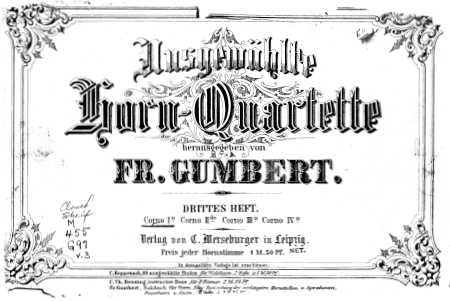
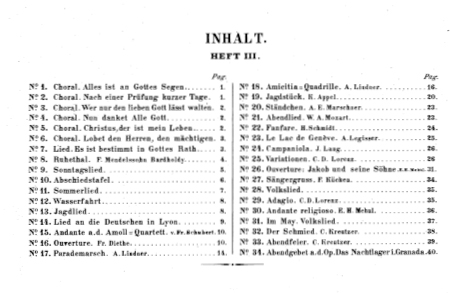

CD71-728488426128